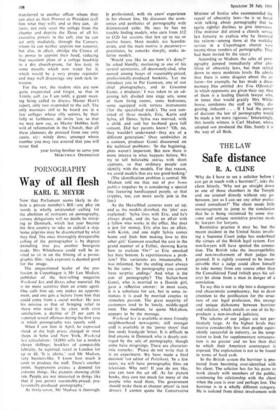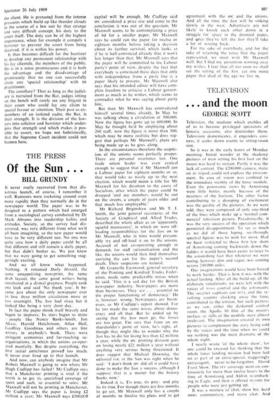THE LAW
Safe distance
R. A. CLINE
'Why do I have to see a solicitor before I can get in touch with a barrister?', asks the client bitterly. 'Why not go straight down to one of those chambers in the Temple and see counsel directly without any go- between, just as I can see any other profes- sional consultant?' The client needs little encouragement to jump to the conclusion that he is being victimised by some tire- some and antique restrictive practice made by lawyers for lawyers.
Restrictive practice it may be, but the recent incident in the United States involv- ing a Supreme Court judge has underlined the virtues of the British legal system. Few non-lawyers will have spotted the connec- tion. The British take the incorruptibility and non-involvement of their judges for granted. It is rightly assumed to be incon- ceivable that a judge could allow himself to take money from any source other than the Consolidated Fund (which pays his sal- ary) let alone from a man in danger of a conviction.
To say this is not to slip into a dangerous and chauvinistic complacency, but to draw attention to the justification for the struc- ture of our legal profession, this strange and unique dichotomy between barrister and solicitor, which entails as one of its by- products a non-involved judiciary.
The salaries of our judges are not par- ticularly large. At the highest levels they receive considerably less than people equiv- alently successful in industry, so the temp- tation to look for supplementary remunera- tion is no greater and no less than that to which their American counterpart is exposed. The explanation is not to be found in terms of hard cash.
In the British system the barrister is pro- tected from becoming over-identified with his client. The solicitor has for his pains to work closely with members of the public; continuing his relationship with the client when the case is over and perhaps lost. The barrister is in a wholly different category. He is isolated from direct involvement with
the client. He is protected from the intense pressures which build up like thunder clouds in the course of a law suit by that strange and very difficult concept, his duty to the court itself. The duty can be of the highest importance, when for example it compels a barrister to prevent the court from being deceived, if it is within his power.
It thus becomes difficult for the barrister to develop any permanent relationship with his lay clientele, the members of the public. He is in a sense promiscuous and it is both the advantage and the disadvantage of promiscuity that no one can successfully claim any 'special relationship' with its practitioner.
The corollary? That as long as the judici- ary is recruited from the Bar, judges sitting on the bench will rarely see any litigant in their court who could lay any claim to special favour or attention. Their past as ex- members of an isolated cadre, the Bar, is their strength. It is the division of the law- yers into solicitor and barrister which under- pins that strength and which makes it pos- sible to assert, we hope not hubristically, that the Supreme Court incident could not !moven here.



































 Previous page
Previous page